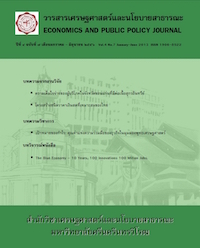เป้าหมายของกำไร: คุณค่าแห่งความร่วมมือของธุรกิจในมุมมองพุทธเศรษฐศาสตร์
Main Article Content
บทคัดย่อ
บทความนี้นำเสนอคุณค่าแห่งความร่วมมือของกรณีศึกษาธุรกิจในประเทศไทย กับผู้เกี่ยวข้องและผลที่เกิดขึ้นจากความร่วมมือนั้น จากบนฐานมุมมองพุทธเศรษฐศาสตร์ ที่แตกต่างจากเศรษฐศาสตร์กระแสหลักหรือเศรษฐศาสตร์นีโอคลาสสิคในกระบวนทัศน์เรื่องธรรมชาติของมนุษย์ ขณะที่ค่านิยมหลักในเศรษฐศาสตร์กระแสหลักอยู่ที่ผลประโยชน์ส่วนตนและการแข่งขันเพื่อบรรลุถึงอรรถประโยชน์หรือสวัสดิการสูงสุดภายใต้ทรัพยากรอันจากัด ค่านิยมหลักในพุทธเศรษฐศาสตร์กลับอยู่ที่ความกรุณาและการร่วมมือระหว่างกันเพื่อบรรลุถึงสุขภาวะจากระดับปัญญาที่สูงขึ้น พุทธเศรษฐศาสตร์คือการประยุกต์พุทธธรรมในการอธิบายกิจกรรมทางเศรษฐกิจ
พุทธองค์ทรงสอนให้มนุษย์ไม่เชื่อในเรื่องต่างๆ จนกว่าจะได้พิสูจน์ด้วยการเรียนรู้จากประสบการณ์จริงของตนเองผ่านการขัดเกลาชำระจิตใจในระดับที่สูงขึ้นหรือที่เรียกว่าการสะสมปัญญา ภายใต้ “กฎอิทัปปัจจัยตา เพราะสิ่งนี้มี สิ่งนั้นจึงมี เพราะสิ่งนี้ไม่มี สิ่งนั้นจึงไม่มี” การดำรงชีวิตของมนุษย์จึงมิได้เกิดขึ้นได้โดยส่วนเดียว แต่ดำรงอยู่ภายใต้ความสัมพันธ์กับสังคม (Society) และธรรมชาติสิ่งแวดล้อม (Nature) หากปราศจากสังคมหรือธรรมชาติ มนุษย์ก็ไม่สามารถดำรงตนอยู่ได้ ดังนั้นผลประโยชน์ส่วนตน (Self-interest) ในพุทธเศรษฐศาสตร์จึงมีความหมายที่กว้างขวาง ครอบคลุมถึงคุณภาพชีวิตทั้งของตนเอง คนอื่นๆ ในสังคม หรือ ธรรมชาติสิ่งแวดล้อม และเมื่อเข้าใจความสัมพันธ์ของการดำรงอยู่ร่วมกันอย่างเป็นเหตุปัจจัยของสรรพสิ่งแล้ว ความร่วมมือจึงเป็นพฤติกรรมที่มีเหตุผล
เมื่อนักธุรกิจเรียนรู้และพัฒนาปัญญาให้ปรากฏเป็นวิถีการดำเนินชีวิตและสะท้อนอยู่ภาวะผู้นำของเขา เขาย่อมไม่มีพฤติกรรมที่สร้างผลกระทบทางลบและเบียดเบียนผู้คน สังคม และธรรมชาติสิ่งแวดล้อม นอกจากนี้เขายังมีคำตอบที่ชัดเจนถึงเป้าหมายของกำไร และสะท้อนภาพได้ชัดเจนถึงวัตถุประสงค์ที่แท้จริงขององค์กรธุรกิจ นั้นก็คือการมีวิสัยทัศน์ในการทาธุรกิจที่ไม่มุ่งหากำไรจากการเบียดพนักงาน สังคมวงกว้าง และสิ่งแวดล้อมทางธรรมชาติแล้ว ยังสร้างความร่วมมือกับทุกฝ่ายเพื่อสร้างคุณภาพชีวิตที่ดีให้กับพนักงาน และกระจายผลกำไรไปสู่ผู้คนและสังคมวงกว้างอย่างยุติธรรม
What is the Objective of Profit? : A Buddhist Economics Approach to Collaboration in Business Firms
This article revealed how collaboration was a part of business practice and its impact on overall performance in business enterprises in Thailand, using a Buddhist Economic framework. Buddhist Economics differs significantly from Mainstream (Neoclassical) Economics in its ontological underpinning. This means that assumptions about human nature are different: the core values of mainstream economics are self-interest and competition in the pursuit of maximum welfare or utility; while in Buddhist Economics, “self” includes oneself, society, and nature, which are all simultaneously interconnected. The core values are compassion and collaboration through which well-being is achieved leading to higher wisdom (pañña).
Buddhist Economics applies Buddha Dhamma to explain economic activity. Buddha teaches us not to believe something until it has been proven to be a true personal experience through a state of higher level of mental development or accumulation of Pañña. According to the principle of Dependent Origination (Idappaccayata), nothing can exist on its own. So, human existence is not isolated but is related to society and nature. Without society and nature, human beings would not have survived. Self-interest in Buddhist economics has a wider meaning, which includes not only oneself but also others in society and nature. When people clearly understand connectedness and interdependence, they will understand more clearly that collaboration is a rational behavior.
When businessmen embrace a right view practice in their behavior and leadership skills, they need to act without making a negative impact or causing harm to people, society and nature. Besides, they need to thoroughly answer what the objective of their profit should be, and reflect on the ultimate purpose of a business organization. Hence their long term vision of business is not to attain profit from the exploitation of employees, the wider society and environment, but to collaborate with others, maintain a good quality of life for their colleagues, and distribute their profit fairly to other people and the wider society.
Article Details
สงวนลิขสิทธิ์ © 2553 คณะเศรษฐศาสตร์ มหาวิทยาลัยศรีนครินทรวิโรฒ
คณะเศรษฐศาสตร์ มหาวิทยาลัยศรีนครินทรวิโรฒ จัดพิมพ์วารสารเศรษฐศาสตร์และนโยบายสาธารณะ เพื่อเผยแพร่บทความวิชาการทางเศรษฐศาสตร์ นโยบายสารธารณะ และสาขาอื่นๆที่เกี่ยวข้อง ทัศนะและข้อคิดเห็นใดๆ ที่ปรากฏในวารสารเป็นความคิดเห็นส่วนตัวของผู้เขียน โดยบทความที่ได้รับการตอบรับจะถือเป็นลิขสิทธิ์ของคณะเศรษฐศาสตร์ มหาวิทยาลัยศรีนครินทรวิโรฒ
บรรณาธิการ อาจารย์ ดร.พลพัธน์ โคตรจรัส


